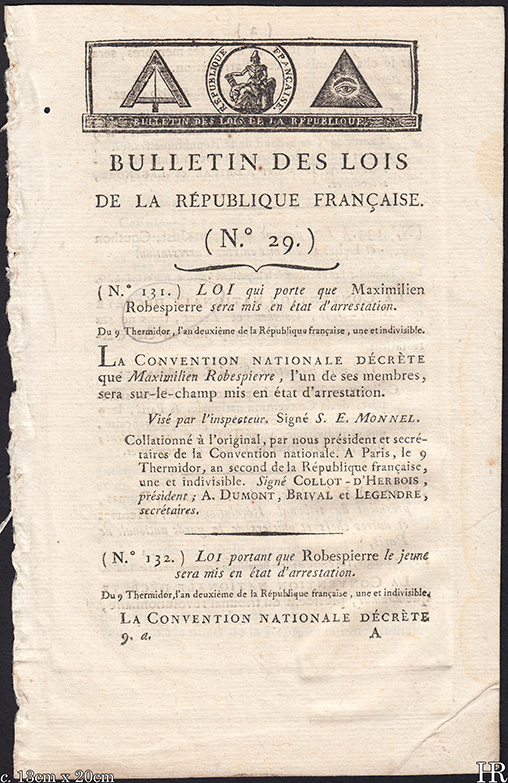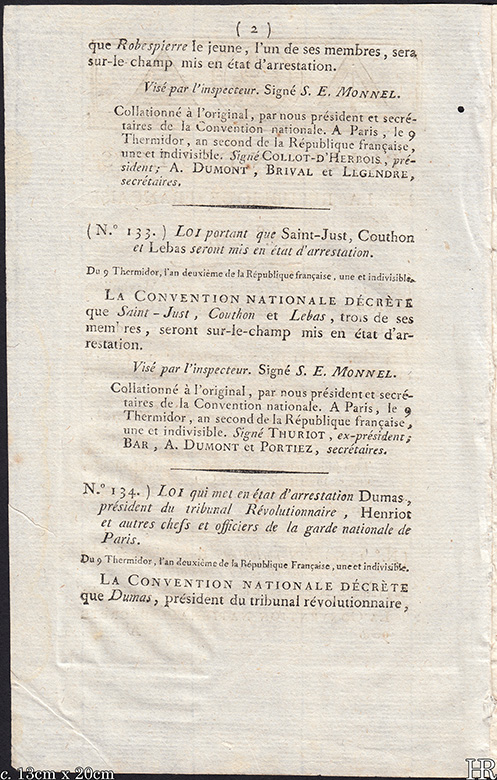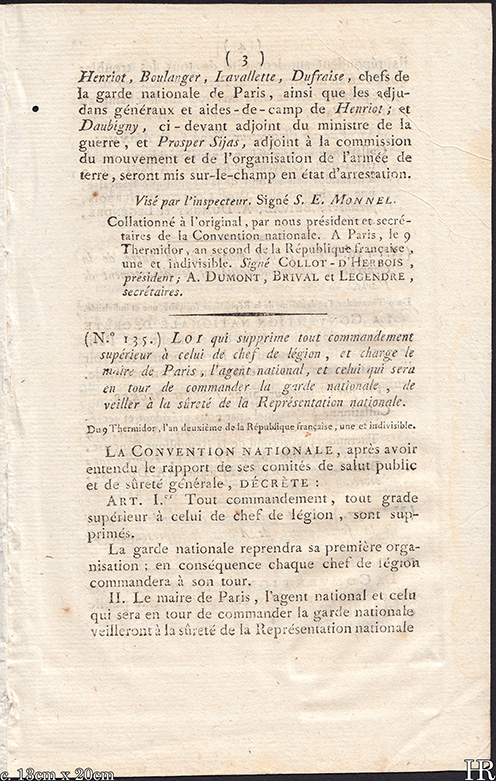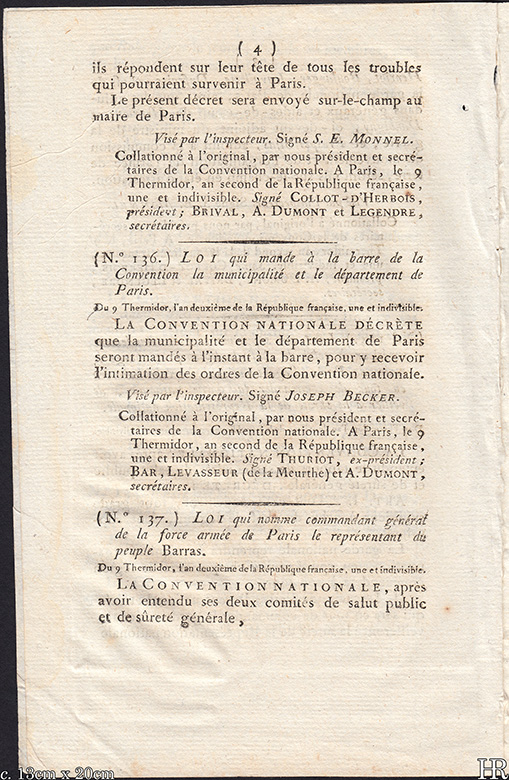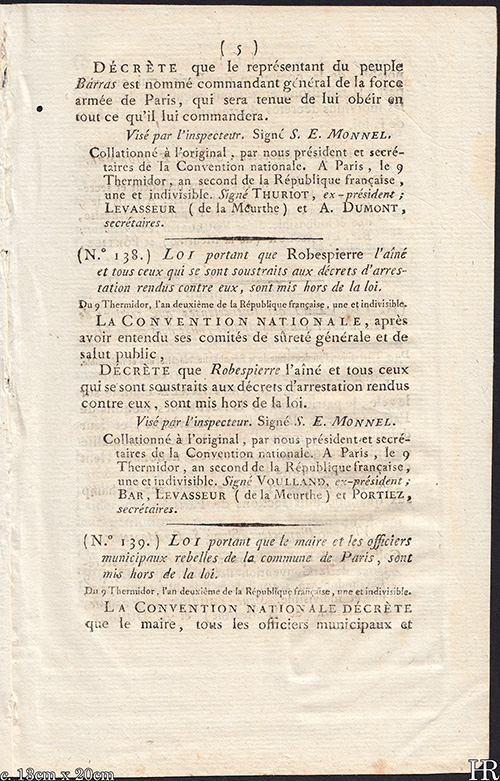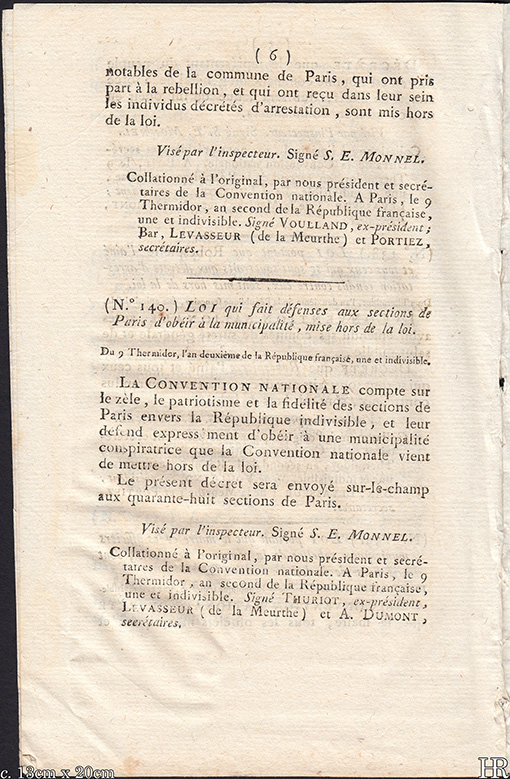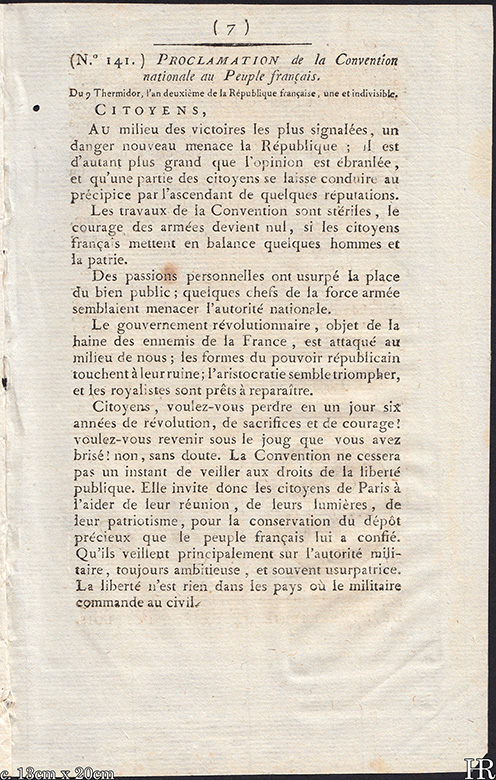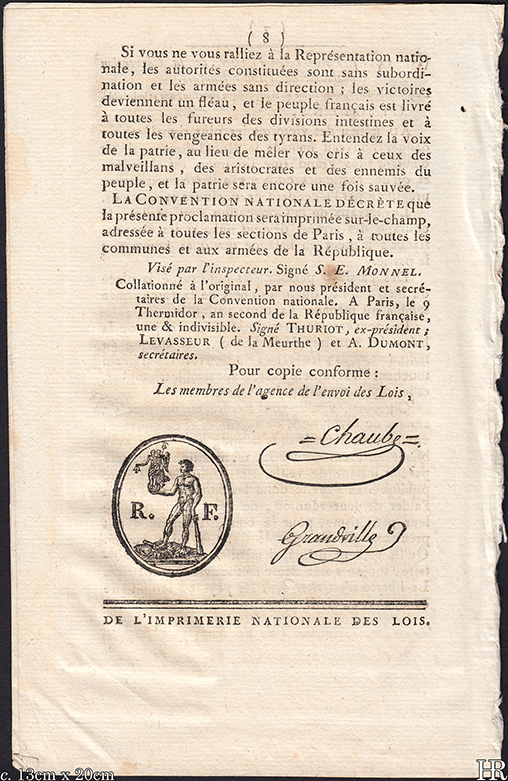FRANCE
The Thermidorean Reaction, 27TH July 1794
The history here is too well-known to need recounting in any detail: Robespierre and his allies on the Committee for Public Safety, having clawed their way to the top of the Revolution, and having murdered their chiefest rivals, were themselves overthrown and executed. As for the fateful meeting of the Convention on the ninth of Thermidor, I shall defer the heavy lifting here to Carlyle, who recounts the events of the day with even more than his usual intensity:
A naïve (but contemporary) depiction of Robespierre and pals being brought to the guillotine at the Place de la Révolution. Couthon lies decapitated, his head displayed to the crowd; Augustin Robespierre is led onto the scaffold. In the tumbril, per the numbering provided, is: (9) Hanriot, (10) Robespierre, showing the slightest hint of his grotesque facial wound, (11) Dumas, (12) Saint-Just, flourishing his handkerchief melodramatically, (13) Lescot Fluriot, mayor of Paris, with his back to the camera. On the ground lies the suicided corpse of Lebas (brought there for the occasion?) Item (4) is Sanson, the state executioner, and (3) is the location of the Faubourg de Saint-Germain, for a bit of local colour. (Full version via Wikipedia)
Tallien's eyes beamed bright, on the morrow, Ninth of Thermidor 'about nine o'clock,' to see that the Convention had actually met. Paris is in rumour: but at least we are met, in Legal Convention here; we have not been snatched seriatim; treated with a Pride's Purge at the door. "Allons, brave men of the Plain," late Frogs of the Marsh! cried Tallien with a squeeze of the hand, as he passed in; Saint-Just's sonorous organ being now audible from the Tribune, and the game of games begun.
Saint-Just is verily reading that Report of his; green Vengeance, in the shape of Robespierre, watching nigh. Behold, however, Saint-Just has read but few sentences, when interruption rises, rapid crescendo; when Tallien starts to his feet, and Billaud, and this man starts and that,—and Tallien, a second time, with his: "Citoyens, at the Jacobins last night, I trembled for the Republic. I said to myself, if the Convention dare not strike the Tyrant, then I myself dare; and with this I will do it, if need be," said he, whisking out a clear-gleaming Dagger, and brandishing it there: the Steel of Brutus, as we call it. Whereat we all bellow, and brandish, impetuous acclaim. "Tyranny; Dictatorship! Triumvirat!" And the Salut Committee-men accuse, and all men accuse, and uproar, and impetuously acclaim. And Saint-Just is standing motionless, pale of face; Couthon ejaculating, "Triumvir?" with a look at his paralytic legs. And Robespierre is struggling to speak, but President Thuriot is jingling the bell against him, but the Hall is sounding against him like an Aeolus-Hall: and Robespierre is mounting the Tribune-steps and descending again; going and coming, like to choke with rage, terror, desperation:—and mutiny is the order of the day!
O President Thuriot, thou that wert Elector Thuriot, and from the Bastille battlements sawest Saint-Antoine rising like the Ocean-tide, and hast seen much since, sawest thou ever the like of this? Jingle of bell, which thou jinglest against Robespierre, is hardly audible amid the Bedlam-storm; and men rage for life. "President of Assassins," shrieks Robespierre, "I demand speech of thee for the last time!" It cannot be had. "To you, O virtuous men of the Plain," cries he, finding audience one moment, "I appeal to you!" The virtuous men of the Plain sit silent as stones. And Thuriot's bell jingles, and the Hall sounds like Aeolus's Hall. Robespierre's frothing lips are grown 'blue;' his tongue dry, cleaving to the roof of his mouth. "The blood of Danton chokes him," cry they. "Accusation! Decree of Accusation!" Thuriot swiftly puts that question. Accusation passes; the incorruptible Maximilien is decreed Accused.
"I demand to share my Brother's fate, as I have striven to share his virtues," cries Augustin, the Younger Robespierre: Augustin also is decreed. And Couthon, and Saint-Just, and Lebas, they are all decreed; and packed forth,—not without difficulty, the Ushers almost trembling to obey. Triumvirat and Company are packed forth, into Salut Committee-room; their tongue cleaving to the roof of their mouth. You have but to summon the Municipality; to cashier Commandant Henriot, and launch Arrest at him; to regular formalities; hand Tinville his victims. It is noon: the Aeolus-Hall has delivered itself; blows now victorious, harmonious, as one irresistible wind.
Of course, things wouldn't be that easy. Robespierre, et al., having been arrested and marched to jail, were freed shortly afterwards: the Commune of Paris, having declared itself for Robespierre and against the Convention, ordered the imprisoned men be freed. Their jailers, faced with two contradictory orders and uncertain of where the real power in France lay that afternoon, complied with the Commune's orders and released their charges. The former prisoners made their way to the Hôtel de Ville and set up an insurgent government there, in opposition to the Convention. Carlyle picks up the story again:
There sit Robespierre and Company, embraced by Municipals and Jacobins, in sacred right of Insurrection; redacting Proclamations; sounding tocsins; corresponding with Sections and Mother Society. Is not here a pretty enough third-act of a natural Greek Drama; catastrophe more uncertain than ever?
The hasty Convention rushes together again, in the ominous nightfall: President Collot, for the chair is his, enters with long strides, paleness on his face; claps on his hat; says with solemn tone: "Citoyens, armed Villains have beset the Committee-rooms, and got possession of them. The hour is come, to die at our post!" "Oui," answer one and all: "We swear it!" It is no rhodomontade, this time, but a sad fact and necessity; unless we do at our posts, we must verily die! Swift therefore, Robespierre, Henriot, the Municipality, are declared Rebels; put Hors la Loi, Out of Law. Better still, we appoint Barras Commandant of what Armed-Force is to be had; send Missionary Representatives to all Sections and quarters, to preach, and raise force; will die at least with harness on our back.
Both sides hastily gathered together what elements of the army and National Guard they could persuade to follow them; the Convention, taking the initiative, stormed the Hôtel de Ville in the earliest hours of the tenth.
About three in the morning, the dissident Armed-Forces have met. Henriot's Armed Force stood ranked in the Place de Greve; and now Barras's, which he has recruited, arrives there; and they front each other, cannon bristling against cannon. Citoyens! cries the voice of Discretion, loudly enough, Before coming to bloodshed, to endless civil-war, hear the Convention Decree read: 'Robespierre and all rebels Out of Law!'—Out of Law? There is terror in the sound: unarmed Citoyens disperse rapidly home; Municipal Cannoneers range themselves on the Convention side, with shouting. At which shout, Henriot descends from his upper room, far gone in drink as some say; finds his Place de Greve empty; the cannons' mouth turned towards him; and, on the whole,—that it is now the catastrophe!
The wounded Robespierre jeered by pro-Convention soldiers, as very effectively depicted by Lucien-Étietienne Mélingue in 1877. To Robespierre's left sits Saint-Just, watched over by two gendarmes. (Wikipedia)
Stumbling in again, the wretched drunk-sobered Henriot announces: "All is lost!" "Miserable! it is thou that hast lost it," cry they: and fling him, or else he flings himself, out of window: far enough down; into masonwork and horror of cesspool; not into death but worse. Augustin Robespierre follows him; with the like fate. Saint-Just called on Lebas to kill him: who would not. Couthon crept under a table; attempting to kill himself; not doing it.—On entering that Sanhedrim of Insurrection, we find all as good as extinct; undone, ready for seizure. Robespierre was sitting on a chair, with pistol shot blown through, not his head, but his under jaw; the suicidal hand had failed. ... With prompt zeal, not without trouble, we gather these wretched Conspirators; fish up even Henriot and Augustin, bleeding and foul; pack them all, rudely enough, into carts; and shall, before sunrise, have them safe under lock and key. Amid shoutings and embracings.
Robespierre lay in an anteroom of the Convention Hall, while his Prison-escort was getting ready; the mangled jaw bound up rudely with bloody linen: a spectacle to men. He lies stretched on a table, a deal-box his pillow; the sheath of the pistol is still clenched convulsively in his hand. Men bully him, insult him: his eyes still indicate intelligence; he speaks no word. 'He had on the sky-blue coat he had got made for the Feast of the Etre Supreme'—O reader, can thy hard heart hold out against that? His trousers were nankeen; the stockings had fallen down over the ankles. He spake no word more in this world.
And so, at six in the morning, a victorious Convention adjourns. Report flies over Paris as on golden wings; penetrates the Prisons; irradiates the faces of those that were ready to perish: turnkeys and moutons, fallen from their high estate, look mute and blue. It is the 28th day of July, called 10th of Thermidor, year 1794.
The item we have here is a collection of the laws passed by the Convention on the 9th Thermidor (many of which Carlyle actually references in his text). First, the arrests of Robespierre, his closest associates, and various other persons regarded as Robespierrists (Nos. 131-134). Second, some later measures as the day wore on and its business remained unfinished (Nos. 135-140). Bringing up the rear is an address from the Convention to the French people, urging them to rally around their rightful government (No. 141). In detail:
- No. 131: Maximilien Robespierre is to be immediately put under arrest.
- No. 132: Augustin Robespierre (“Robespierre the younger”) is to be immediately put under arrest.
- No. 133: Louis de Saint-Just, Georges Couthon and Philippe Lebas are to be immediately put under arrest.
- No. 134: also to be put under arrest immediately:
René-François Dumas (president of the Revolutionary Tribunal)
François Hanriot (general, commanding officer of the Paris National Guard)
Servais Boulanger (general of the Paris National Guard)
Jean-Baptiste de Lavalette (general of the Paris National Guard)
Simon Dufresse (general of the Paris National Guard)
All of Hanriot's adjutants and aides-de-camp
Jean-Louis d'Aubigny (described as a former deputy Minister of War; at this time he seems to have held a post with the Agency for Military Transport)
Prosper Sijas (deputy head of the Commission for the Organisation and Movement of the Army)
- No. 135: everybody holding a rank or appointment in the National Guard higher than chef de légion (colonel, approximately) is dismissed from their positions. The Guard will revert to (what was, apparently) its previous command structure: overall command will rotate between the various chefs. In the event of any disorder arising in Paris, the mayor, the agent national (a sort of public prosecutor, seemingly) and the chefs of the Guard "will answer with their heads"(!)
- No. 136: the municipal and departmental governments of Paris are summoned to the Convention to account for themselves.
- No. 137: Paul Barras is given command of the pro-Convention forces in Paris.
- No. 138: Robespierre and anybody else who has escaped arrest is declared an outlaw.
- No. 139: the mayor of Paris, the municipal government of Paris and "notables of the Paris Commune" who have taken part in the Robespierrist insurrection are declared outlaws. Anybody aiding and abetting the aforementioned outlaws are declared outlaws as well.
- No. 140: the Convention exhorts the people of Paris to show their loyalty to the indivisible Republic, and forbids them from obeying the "conspiratorial municipality" which, it reminds the nation for emphasis, it has outlawed.
- No. 141: a rousing harangue to the nation. "In the midst of the most illustrious victories, a new danger menaces the Republic..." "Personal passions have usurped the public good..." "Citizens, would you throw away six years of revolution, six years of sacrifice and courage, in a single day?" "Listen to the voice of la patrie, instead of joining the cries of the villains, the aristocrats and the enemies of the people, and the country will be saved once again." This proclamation is ordered to be printed immediately and sent all around France, and to the armies.
Philippe Lebas shot himself in the Hôtel de Ville. Robespierre, already halfway dead, was sent to the guillotine on the afternoon of the tenth. Augustin Robespierre, Saint-Just, Couthon, Hanriot, Dumas and Lavalette were executed alongside him. Boulanger and Sijas were guillotined the day after that. Jean-Louis d'Aubigny appears to have turned state's evidence successfully (he testified for the prosecution when Antoine Fouquier-Tinville was put on trial the following year), and he held a succession of mid-level government posts until he was arrested again following the 1800 Coup du Brumaire. Napoleon eventually deported him to French Guyana where he died of the climate in 1804. Simon Dufresse successfully defended himself at his trial(!) and died in 1833 as a Napoleonic war hero, commandeur of the Legion of Honour and chevalier of the Order of Saint Louis(!!)
The details of the Bulletin des Lois I'm a little uncertain about. Per Wikipedia, it first appeared in June 1794, and was intended to be distributed to every commune in the Republic to make sure the Convention's decrees were known throughout the country. The Bulletin seems to have only been printed in Paris: a contrast with the previous system where (as far as I can work out) certified-copy decrees were printed in Paris and sent to the capitals of the Départements to be copied further by local printers. The Bulletin would have had the effect of centralising printing in Paris, which presumably appealed to the tendencies of the governments of the time. Each individual decree is signed on behalf of "the inspector" by one S. E. Monnel, and below that appears to be the signatures as would have appeared on the original decree: the president of the Convention and two secretaries. Prominent anti-Robespierrist Jacques-Alexis Thuriot (mentioned extensively in the excerpts above) makes several appearances here, as does Jean-Marie Collot-d'Herbois, a pro-Robespierrist and member of the Committee for Public Safety. Collot-d'Herbois managed to see which way the wind was blowing early on in the day, and defected to the anti-Robespierrist camp: to the extent of presiding over the Convention as it decreed its condemnation of Robespierre, as we see. Ultimately, however, this wasn't enough to save him: he was later arrested and, while he escaped execution, he was deported to Guyana where, like, d'Aubigny, he perished. Bringing up the rear are the signatures of Citizens Chaube and Grandville, on behalf of the Agency for Distribution of the Laws, and a printed seal of the state. The seal shows the striking design in use at this point: Hercules treading on symbols of royalty and holding two allegorical figures, one with a Phrygian cap and the other [that triangle dealie also on the first page of the Bulletin].
Actually when this was printed is unclear: it collects the decrees passed on the ninth but I suppose there's no reason why it needed to have been produced then. One imagines the Convention had more important things on their mind as they sat in panicked, determined all-night session than ensuring the Bulletin was made up. On the other hand, with a rival government having established itself, there would have presumably been some use in the Convention getting its decrees out into circulation: Decree No. 141 orders that the Convention's address be printed and distributed, and Carlyle vividly illustrates the effect hearing the declaration of outlawry had on the pro-Commune forces. At any rate, if this wasn't printed on the ninth I imagine it dates from only a few days later.
The Revolutionary Tribunal seems to have had a rudimentary session on the morning of the tenth, where the death sentences for Robespierre and his allies were formally handed down. This hearing presumably produced some kind of written document which would compliment this one nicely (if I could find it).
8 Pluviôse An. CCXXVI
A complete list of persons executed on the 10th Thermidor, taken from my good friend the Liste Générale. An additional sixty-eight people were executed the following day. This is my source for the day of Prosper Sijas' death, to which otherwise I can find no reference.
Technical details: scanned at 600dpi (each page in one part), levelled and resized 50%.


